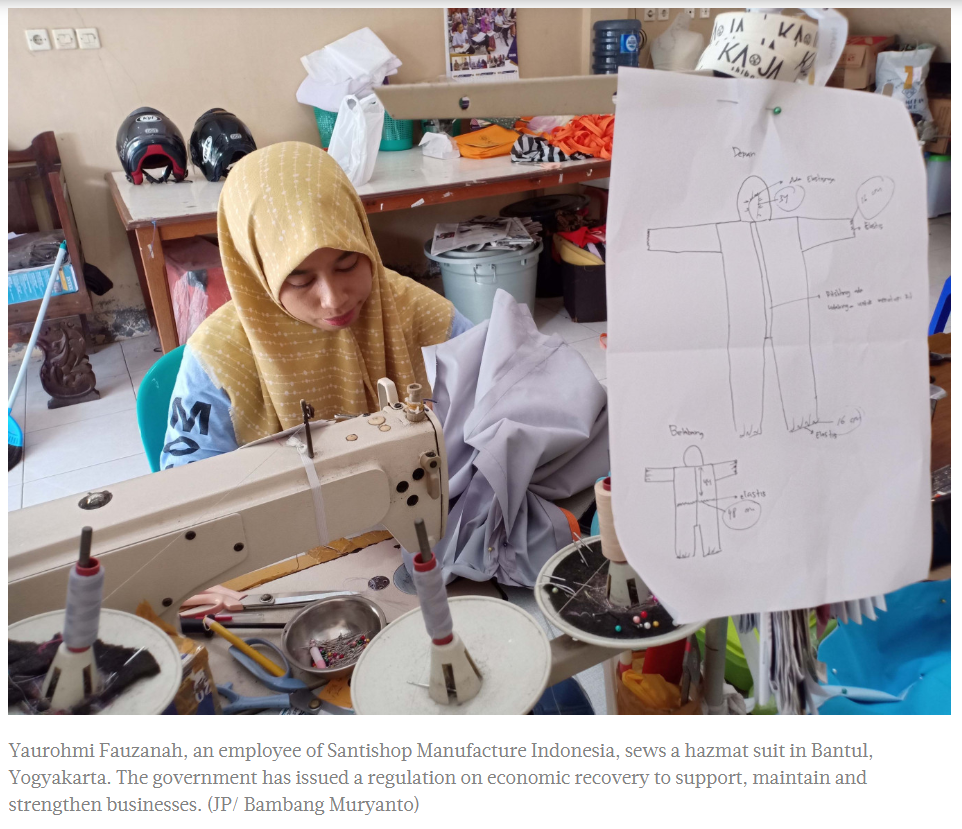Indonesia: Government issues regulation on economic recovery program, focuses on SOEs, MSMEs
The government has issued a regulation on economic recovery to support, maintain and strengthen businesses, stipulating state capital injections for ailing state-owned enterprises (SOEs) and loan subsidies for small businesses, among other things.
Under Government Regulation (PP) No. 23/2020 on the national economic recovery program, which took effect Monday, the government will carry out efforts to support the recovery of the virus-battered economy. The efforts will be carried out through state capital injections (PMN), fund placements at certain banks, government investment and state guarantees.
The government can also implement the program through state spending policies, the regulation reads.
The PMN for SOEs aims to strengthen capital structure of the companies or their subsidiaries affected by the outbreak and to increase the SOEs and their subsidiaries’ capacity in carrying out economic recovery programs mandated by the government. The PMN will be issued in accordance with prevailing laws.
According to the Finance Ministry presentation material presented in a meeting with lawmakers recently, a copy of which was obtained by The Jakarta Post and was neither denied nor confirmed by the ministry upon contacted by the Post on Tuesday, the government has allocated Rp 318.09 trillion (US$21.28 billion) for the program.
Of the amount, more than Rp 152 trillion is allocated for SOEs, such as national flag carrier Garuda Indonesia, which will receive government investment for working capital worth Rp 8.5 trillion, steelmaker PT Krakatau Steel (Rp 3 trillion) and State Logistics Agency (Bulog), which will get Rp 13 trillion in working capital.
Garuda Indonesia has been struggling to pay its sukuk, due in June, and to maintain its cash flow as the outbreak hits air travel demand. Krakatau Steel, meanwhile, has been struggling to pay its debts even far before the outbreak hit the economy.
The funds for the SOEs will also be channeled to state-owned oil giant Pertamina (Rp 48.25 trillion) and electricity company PLN (Rp 45.42 trillion) in the form of accelerated compensation payments, according to the presentation material.
In addition, the PP also regulates that the government can place funds with certain interest rates at domestic banks, called participant banks, which provide loan restructuring and disburse additional loans to businesses to provide more liquidity to the banks. The participant banks must be conventional ones, with at least 51 percent of their stake are owned by Indonesian individuals or entities, be categorized as healthy banks according to the Financial Services Authority (OJK) assessment and be one of the country’s 15 largest banks in assets value.
The presentation material showed that the government allocated Rp 35 trillion for the fund placements.
“The participant banks will later function as supporting banks to provide liquidity for [other] banks, including secondary banks (BPR), that have also provided loan restructuring and disbursed additional loans to businesses,” the PP reads. The liquidity provision will be in the form of a business-to-business scheme.
The government will also be allowed to make long-term investments in stocks, debt papers and/or direct investment to gain economic, social and other kind of benefits. It is also allowed to give financial guarantees, both directly and indirectly, to businesses impacted by the outbreak.
The ministry’s presentation material showed that the government allocated Rp 63.01 trillion in tax incentives for businesses and Rp 6 trillion in MSMEs new loans guarantee.
The government also set aside Rp 25 trillion in “tourism support”, which will be in the form of airfare and hotel discounts, as well as food vouchers via online applications, among other things.
The coronavirus outbreak has badly hit Indonesia’s economy as people are required to stay at home to contain the virus spread, forcing offices, factories and shops to close. The country’s gross domestic product (GDP) grew to a 19-year low of 2.97 percent in the first quarter as the government’s worst case scenario expects the economy to contract 0.4 percent this year from 5.02 percent growth in 2019.
Aside from the four efforts, the government can also provide loan interest subsidies for micro, small and medium enterprises (MSMEs) using state funds, according to the PP. The presentation material revealed that the government set aside Rp 34.15 trillion in loan interest subsidies for ultra-micro enterprises and MSMEs and cooperatives.
“The government can issue debt papers that will be bought by Bank Indonesia [BI] at primary market [auctions] to fund the national economic recovery program (PEN),” the PP reads. The bond purchases will be done gradually based on the real funding needed by the program, it added.
Regulation in Lieu of Law (Perppu) No. 1/2020 has provided a legal basis for the central bank to buy government bonds at auctions to help fund the battle against COVID-19. Previously, BI could only buy the debt papers in the secondary market.
Source: https://www.thejakartapost.com/news/2020/05/12/government-issues-regulation-on-economic-recovery-program-focuses-on-soes-msmes.html


 Thailand
Thailand




